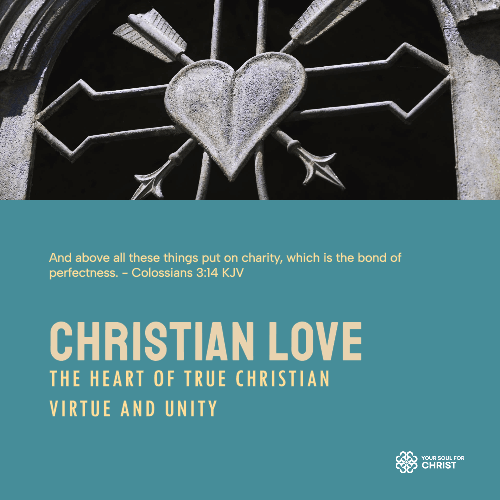And above all these things put on charity, which is the bond of perfectness.
Colossians 3:14 KJV
Christian love is more than just emotional affection; it reflects God’s selfless, sacrificial, and unconditional love. As Paul emphasises in Colossians 3:14, Christian love is the bond that unites all virtues in perfect harmony. Without Christian love, even the most admirable qualities cannot fully function as God intends.
The word “charity” in this verse is from the Greek word agape, which means love. This type of love goes beyond mere emotional affection. It is a selfless, sacrificial, and unconditional love that reflects the nature of God. In the preceding verses, Paul discusses Christian virtues such as humility, kindness, meekness, patience, and forgiveness (Colossians 3:12-13). However, he emphasises that love (charity) is superior to all these virtues because it unites and completes them. Love is “the bond of perfectness,” meaning it holds all these qualities together in perfect harmony. Without love, the other virtues cannot fully function as God intends.
As believers, God expects us to love one another as we love ourselves. Anything done outside of love is unacceptable in God’s sight. As 1 Corinthians 13:1-3 states:
If I speak with human eloquence and angelic ecstasy but don’t love, I’m nothing but the creaking of a rusty gate. If I speak God’s Word with power, revealing all his mysteries and making everything plain as day, and if I have faith that says to a mountain, “Jump,” and it jumps, but I don’t love, I’m nothing. If I give everything I own to the poor and even go to the stake to be burned as a martyr, but I don’t love, I’ve gotten nowhere. So, no matter what I say, what I believe, and what I do, I’m bankrupt without love.
1 Corinthians 13:1-7 MSG
This passage makes it clear that love is the true measure of faith and obedience. Likewise, Jesus summarised the entire Law and Prophets by commanding us to love God and love our neighbours as ourselves (Matthew 22:37-39). Without love, no amount of religious devotion, knowledge, or power can fulfil God’s will.
So, in 1 Corinthians 13, Paul emphasises that without love, even the greatest spiritual accomplishments are meaningless. Love gives purpose, meaning, and integrity to everything we do. Jesus rebuked the Pharisees for their outward displays of righteousness—such as fasting, tithing, and praying—because their actions were not driven by genuine love for God or people. Despite their religious knowledge, their hearts were far from God, and Jesus condemned their hypocrisy.
A perfect example of this love is Jesus’ sacrificial act on the cross. In John 15:13, Jesus says, “Greater love hath no man than this, that a man lay down his life for his friends.” This ultimate expression of love is the kind Paul urges believers to “put on.” Another example is the Good Samaritan (Luke 10:25-37), who showed unconditional love to a total stranger. His compassion, generosity, and willingness to help exemplify Christian love, transcending societal expectations and personal convenience.
Finally, Jesus summarised the entire Law with two commandments: love God and love others. These commandments form the essence of Christian living, just as Paul describes love as the “bond of perfectness” that binds together all other virtues.
In conclusion, love is the essential foundation of the Christian life. Just as clothing covers and protects the body, love covers and completes all other virtues, making them effective and harmonious. Without love, the qualities Paul mentions—such as kindness, patience, and forgiveness—would be hollow. As seen through the life of Christ and echoed throughout Scripture, love is central to both our relationship with God and our relationships with others. Therefore, let us “put on” love as the bond that holds everything together in perfect unity.
Prayer Point: God, help me to walk in Love every day of my life.
